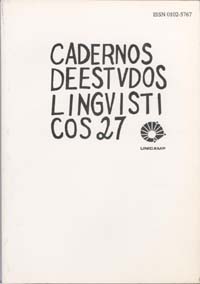Resumo
The influence of philosophical trends has been pervasive in the very formation of linguistic theories. This article analyses such influence in what concerns acquisition theories. The assumption is that in this field linguistic theories are subject to the bias of philosophical presuppositions that ground the theories thewselves. Thus, such theories are usually supported by concepts which have been directly inherited from philosophical tradition. Representative examples are concepts such as «mind», «spirit», «innate ideas», «acquired ideas», «perception», «organism», «comprehension», and so on. Such concepts remain as established pressuppositions even in more recent acquisition theories. In that sense, the models to be referred to in this article are the model of principles and parameters, the competition model as well as Slobin’s model. The basic theoretical cleavage between innatism and behaviorism, which is based on this philosophical tradition, continues to influence ongoing research. With the help of Wittgenstein’s ideas, this article intends to re-evaluate thetraditional pressuppositions involved in acquisition theories. Wittgenstein’s work seems to show that acquisition theories problems may be derived from the very presuppositions which produce the cleavage between innatism/behaviorism and which
define the sense of the questions in this field of research.
Referências
ATKINSON, Martin (1992). Children’s Syntax. Oxford, Blackwell.
BAKER, G. P. & HACKER, P. M. (1988). Wittgenstein. Meaning and Understanding. Oxford, Blackwell.
BATES, E. & MACWHINNEY, B. (1987). ‘Competition, variation and language learning.’ In B. MacWhinney (org.). Mechanisms of Language Acquisition. Hillsdale, N. J., Lawrence Erlbaum (p 157193).
CHOMSKY, Noam. (1986). Knowledge of Language. New York, Praeger.
KATZ, J. J. (ed.) (1985). The Philosophy of Linguistics. Oxford, Oxford University Press. (p 172- 203).
MILNER, Jean-Claude (1989). Introduction à une Science du langage. Paris, Seuil.
PETERS, A. (1985). ‘Language Segmentation: Operating Principles for the perception and analysis of language’. In Slobin (org) The crosslinguistic study of language acquisition. Vol. 2: Theoretical Issues. Hillsdale, Lawrence Erlbaum. (p 1029-1068).
SLOBIN, D. (1985). ‘Crosslinguistic evidence for the language-making capacity’. In Slobin (org). The crosslinguistic study of language acquisition. Vol 2. Hillsdale, Lawrence Erlbaum.
O periódico Cadernos de Estudos Linguísticos utiliza a licença do Creative Commons (CC), preservando assim, a integridade dos artigos em ambiente de acesso aberto.

